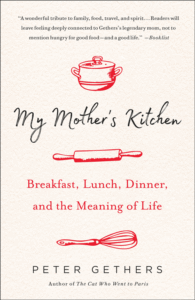Reviewed by NEAL GENDLER
You have to be pretty special for chef Wolfgang Puck to stop in to make your family’s Thanksgiving dinner when your husband is dying in a hospital — and following up with regular gifts of food.

Judy Gethers was special — not only to son Peter, author of My Mother’s Kitchen, but to Puck, a friend of four decades. She was also special to cooks who took her classes and bought her cookbooks and to chefs worldwide who treated her like royalty when she visited their restaurants.
And unlike master chefs who enter the culinary world in their teens, Judy Gethers, mother of two boys, didn’t start a real job until she was 53.
“She was quite suddenly immersed in a whole new understanding of and appreciation for food,” says Gethers, a writer, editor and screenwriter. Eventually, “she could bite into something and taste every ingredient … and after tasting it, she could recreate it from scratch.”
My Mother’s Kitchen, newly out in trade paperback, is not a recipe book, although it contains detailed recipes — with humorous annotations — for Judy Gethers’ ideal menus.
“My intention, my sole goal while writing this book, was to cook with my mom, to share the breakfast and lunch menus with her as I went along, and to become proficient enough in the kitchen so I could make her the dinner of her dreams,” inviting people important to her and to whom she was important, Gethers says.
Although he wasn’t devoid of kitchen skills, he admits to being too obstinate and impatient to follow recipes.
For this, he’d have to: Some dishes were complicated. All were chosen “not just because they are delicious but because they have emotional resonance … in some way deeply meaningful to my mom.” One was sentimental for him: chocolate pudding made by the family’s longtime helper, Louise Trotty, “also my parent.”
The result is a funny, self-effacing tale of the author’s and his mother’s lives, the happy consequences of her culinary success and some insightful thoughts about life and relationships.
Presented in order as breakfast, lunch and dinner, Kitchen contains interesting recipes, some from famous restaurants, but they’re a minor part of the book. If you’re not inclined to make some of the dishes — and if you keep kosher, you won’t be — or even to make any, you’ll find an easy, breezy, very enjoyable read.
The first recipe is Ratner’s matza brei, “not a food that most people are even aware exists … Think of it as a kind of Hebrew French toast,” matza fried either stirred in the pan or served pancake style.
That Pesach staple is followed by eggs Benedict, made with Canadian bacon. Appearing later are recipes mixing meat and milk, even shellfish and pork.
That’s a change for a daughter of Jacob Harmatz, a founder and operator of Ratner’s, the famed Lower East Side kosher dairy restaurant.
We get a brief history of Ratner’s and of Harmatz’s generosity: He refused to charge his children and grandchildren for eating and sent them home with boxes of baked goods. We also get Gethers’ story of Ratner’s sad demise. It closed in 2002, victim, he says, of Harmatz heirs putting profit before quality.
Judith Harmatz married her wartime sweetheart, an aspiring actor who figured he’d get more work as Steven Gethers than as Seymour Gushen. Work was irregular, so he moved into screenwriting, playwriting, directing and producing. He lived large, enjoying good restaurants and wine, which led to frequent dinners at Puck’s first Los Angeles restaurant, where Judy casually asked Puck for a job.
She began at the bottom but learned quickly, eventually managing Puck’s cooking school and co-teaching with Julia Child. She and a niece produced The World Famous Ratner’s Meatless Cookbook. A much-in-demand cooking teacher, and host of dinners to which an invitation was a badge of honor, she “became the doyenne of the L.A. food world,” he says.
“She wasn’t just my mother anymore. She was a person with a real life and real accomplishments… Cooking wasn’t just her job now, it was her all-consuming passion.”
In 2007, she suffered a stroke that doctors said would leave her unable to move or speak. She did both, with difficulty, her stroke-induced aphasia vanishing when she would smart off to Peter.
Partially paralyzed, she no longer could cook, “but her superb palate was unchanged,” and despite her aphasia, “she still had the ability to teach,” making her hired cooks’ food even better.
Gethers, who loves good food so much he bought a home in Sicily to occasionally be near it, makes a rather longish diversion into wine, and drops more than a few names, but his writing is so delightful that criticizing would be petty.
Even if your interest in cooking doesn’t extend beyond enjoying — or enduring — someone else’s efforts, My Mother’s Kitchen is a hoot.
***
Neal Gendler is a Minneapolis writer and editor.
(American Jewish World, 9.7.18)




















